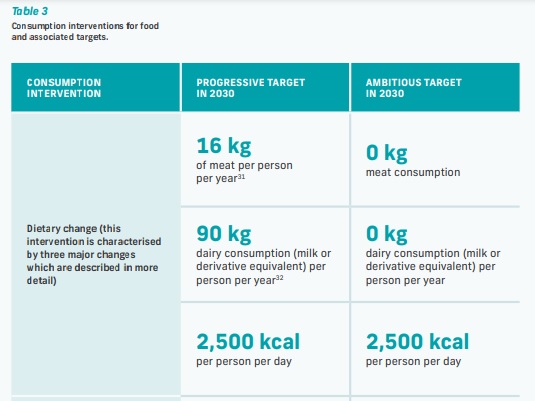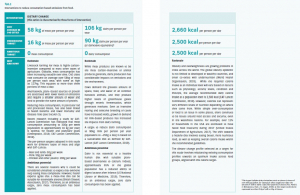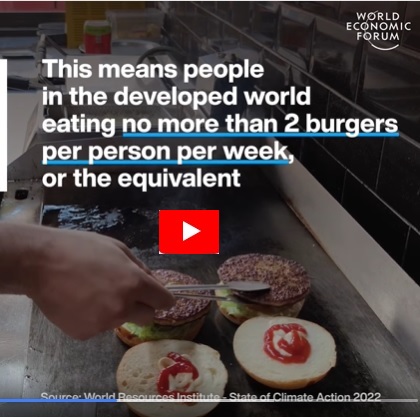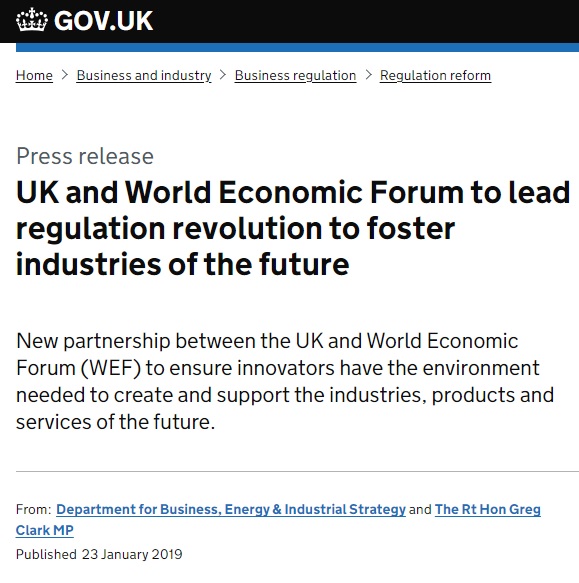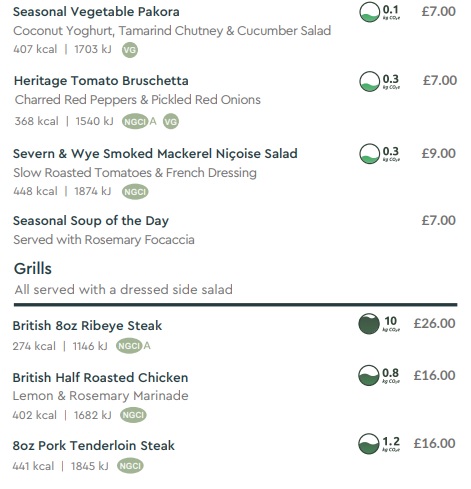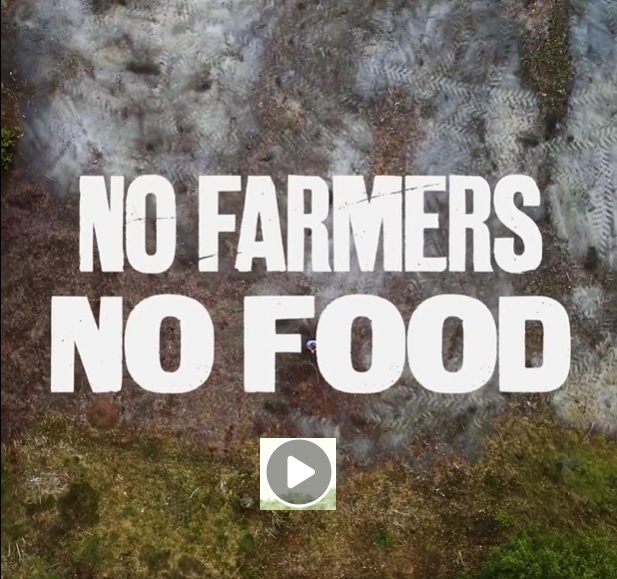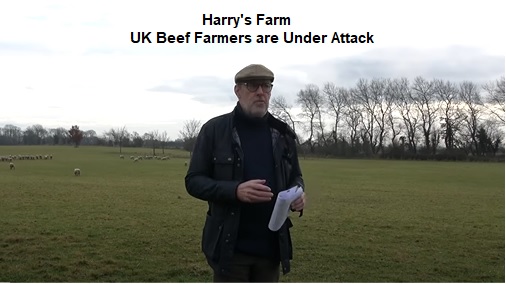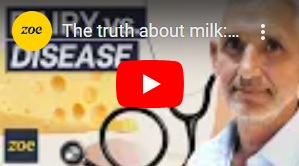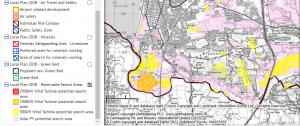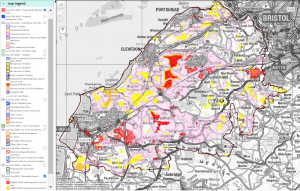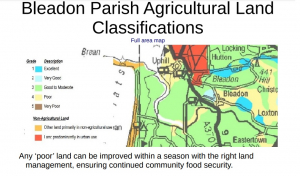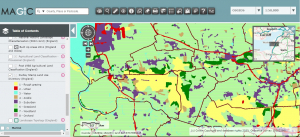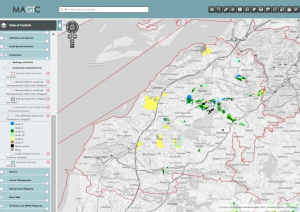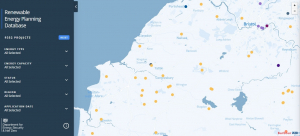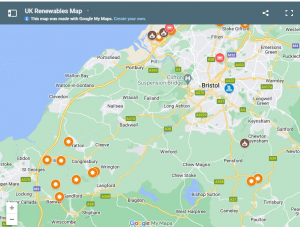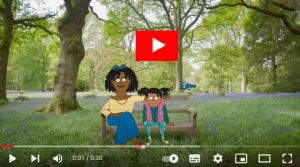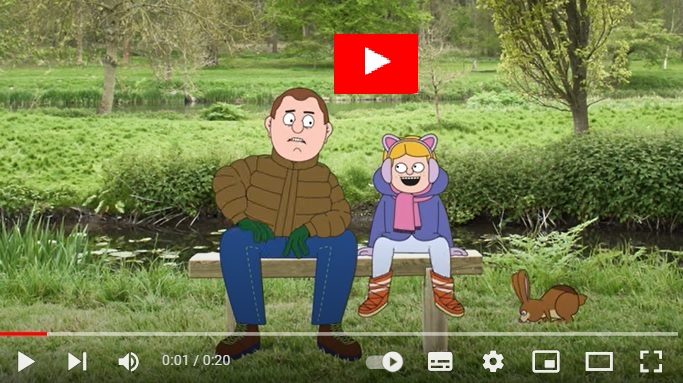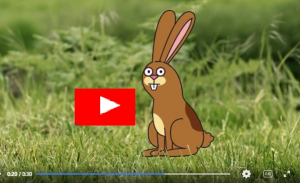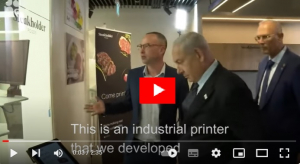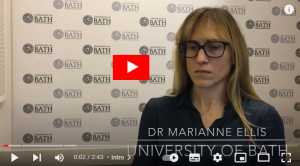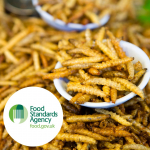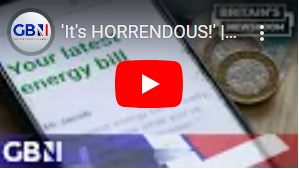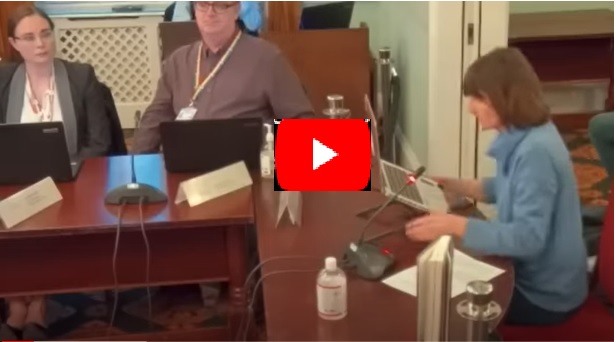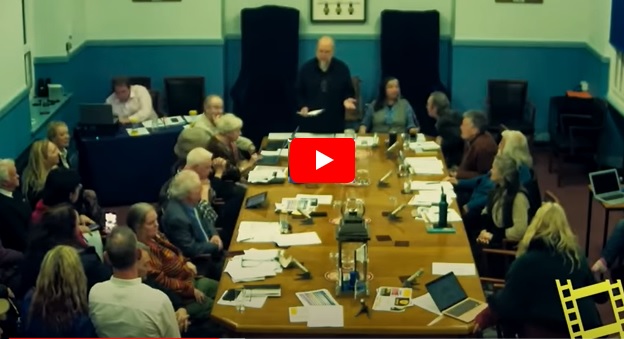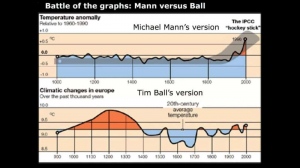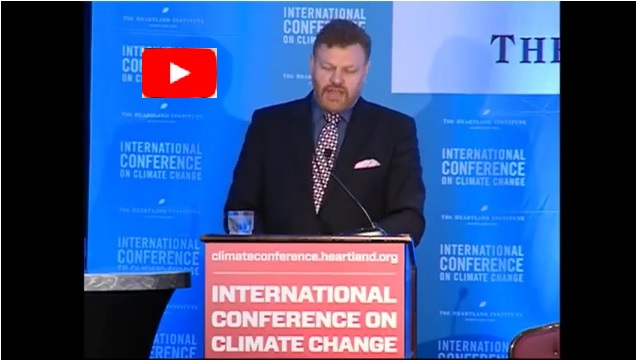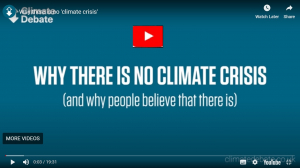Also like us on...
and Twitter Follow @BleadonTweet

NET ZERO EATING
What does this mean? What will be the effect on our food, farming and way of living if we fill the fields with solar panels, trees and wildflowers, instead of animals and crops?
Are extreme policies based on natural or manmade climate change? Does computer modelling actually represent real world outcomes? Are people being fully informed and asked their opinion before life changing actions, potentially irreversible, are undertaken?
City Mayors aim for Zero Meat & Dairy [Note 1]
(See C40 proposed eating plan and land use mapping and dietary issues)
|
Zero Meat & Dairy Target "31 Current average meat consumption in C40 cities is 58 kg per person, three times the target" "32 Current average dairy consumption in C40 cities is 155 kg per person, 1.7 times the target" (pg78-91) |
Rationale (pg20-21) |
QUESTIONS:
- If "Water vapor accounts for the largest percentage of the greenhouse effect, between 36% and 66% for clear sky conditions and between 66% and 85% when including clouds" (Wiki - 25AUG23) then why is essential farming needed for human health and wellbeing being targeted? E.g. in 1995 it was stated that, "The contribution by cattle to any global warming that may occur in the next 50 to 100 yr has been estimated to be a little less than 2%" (See page 3 1995 and Note 6) Manmade CO2 vs natural CO2 needs to be fully debated and properly understood before life changing policies, laws, etc. are made and enforced. e.g. CO2 Quiz
- Do our 'leaders'/public representatives really intend us all to become vegans, to stop eating ALL meat and dairy? (NB Vegetarians eat dairy from animals the same as meat eaters)
- Has it been proven that a pure vegan diet is good for our health?
- The stated EAT-Lancet study indicates meat and dairy is required (i.e.334g/day or 122kg/yr), "low amounts of animal source foods... ranges of food intakes, which combined in a diet, would optimize human health" (pg10)
-
Why NO MEAT or DAIRY for C40 Mayors' Net Zero proposal for mayors and councils to achieve in the future?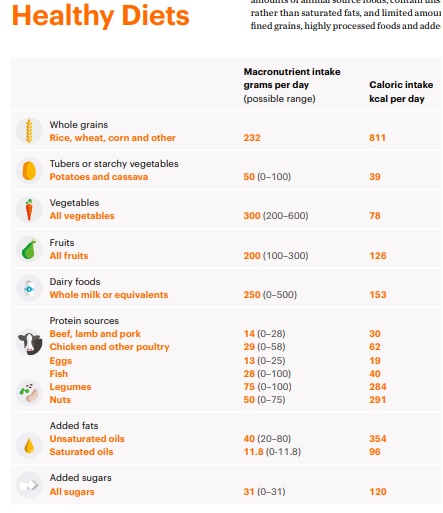
So why does C40 Cities/Mayors propose a significantly lower meat and dairy eating to 240g vs 334g per day? [Note 2]
However, the public have a different idea of what they want to eat, "Data from multiple organisations, including the Office for National Statistics (ONS), shows that meat consumption is rising steadily" (Article & 21JUN23)
Telegraph Article - "No meat, no dairy and three outfits a year: Welcome to Sadiq Khan’s plan for London C40, a global group of city mayors chaired by Sadiq Khan, has a radical vision of net zero that critics say will restrict personal choice" (15SEP23) related to C40 Cities document pages 78-91. See also beef and lamb phased out 2030-2049 - UK Fires government document below.
World Economic Forum & UK Government Policy
Our future seems to be in the hands of government global partnerships rather than through local and national democratic discussion, debate and voting? [Note 10] Not all farmers are landowners, so if the land is sold or repurposed as woodland, wildflowers or solar panels, what will happen to food security? What do government propose we eat, 3D printed food & insects?
|
|
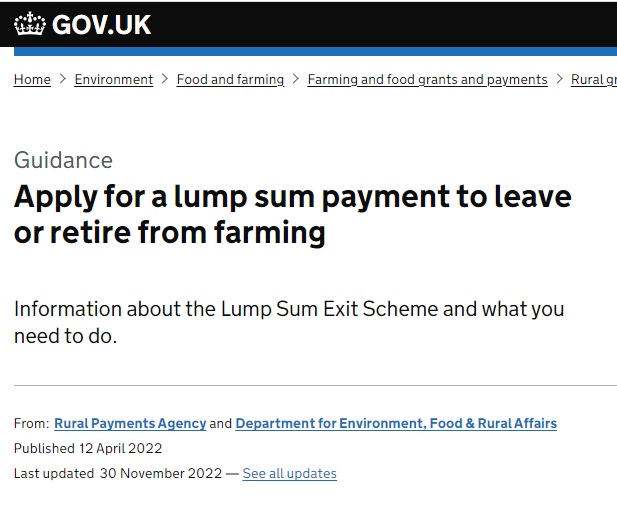 |
- How long before mandated Personal Carbon Credits will be related to eating meat and dairy (wiki - 28JAN23) or Personal Carbon Trading/Rationing (wiki - 23AUG23)? An [Note3]
- NB The UK already has Business Carbon Credits - UK Emissions Trading Scheme "The free allocation of allowances to eligible installation operators and aircraft operators continues, to reduce the risk of carbon leakage for UK businesses." (17APR23) [Note 5]
- Are global interests more important than local and national interests? [Note 10]
How much Government public money is being spent on Carbon Net Zero projects, and will they achieve the stated outcomes, especially without affecting our food security? (Note 3)
Is British farming facing an existential crisis?
"The UK’s self-sufficiency is ‘slipping’, with many growers reporting receiving minuscule return" ... "As NFU president Minette Batters put it in December, the very existence of British food production is now “under threat”. (Article - 07MAY23)
"EpochTV announces the release of "NO FARMERS NO FOOD: WILL YOU EAT THE BUGS?" premiering on EpochTV Sept. 25 (Epoch clip here and alternative here)
"NO FARMERS NO FOOD: WILL YOU EAT THE BUGS?" is an Epoch Original documentary exposing the hidden agenda behind global "Green Policies," the untold stories of farmers forced out of business, the disruption this will have on our food supply, and why edible bugs are suddenly being pushed to the fore as a "Global Green Solution." (Article/Documentary link and 07SEP23) Registration here.
CURRENT PARLIAMENT PETITION HERE - Deadline 14 March 2024 (PDF)
"A survey calling on retailers to provide a fairer deal to the UK's struggling farmers has reached over 50,000 signatures, but supermarkets are yet to respond." (Article on 07OCT23)
(Harry's Farm Video 17mins)
European Commission - Grazing for Carbon (10MAY17)
"The potential of grasslands as a sink for carbon is enormous in Europe"
What happens to our health when animals are no longer reared for dairy - cheese, yoghurt, butter, milk? Will we be expected to depend on mineral and vitamin additives to alternative plant-based processed 'milk' (e.g. almond, oat, soy) and 'foods'?
"... we also know that Dairy it's maybe protective against some cancers so there's really consistent evidence that people have higher intakes of dairy have lower risk of colon cancer for example... when we talk about fermented we mean cheese we mean yogurt when we're talking about the non-fermented we mean milk and ...butter... we're talking about fermented dairies these contain probiotic microorganisms that we know now from clinical trials are good for the immune system they have an effect within a few weeks" (12SEP23)
"Our findings point to a need to ensure that consumers are aware that many plant-based milk alternative products in the marketplace today are not nutritionally equivalent to cow's milk," said Johnson" (Article and 24JUL23)
Where is North Somerset Farmland?
District Councils - proposed use of farmland for solar, wind and housing
North Somerset Council (NSC) proposes blanket solar and wind development across the district, along with new housing development. What will happen to farm land for meat, vegetables and fruit and our food security? How much District Council public money is being spent on Carbon Net Zero projects, and will they achieve the stated outcomes without affecting our food security?
|
WHERE IS ALL THE FARM LAND AND FOOD SECURITY? |
|
|
NSC Local Plan suggested solar sites
See Land Classification below - Why is there proposed development on farmland? |
TICK LEGEND: Local Plan 2038 - Renewable Search Area and Proposed Residential Sites (incl Green Belt) |
-
NSC Local Plan Proposed Housing and 'Green' locations 1K homes a yr for 15yrs "Huge swathes of land will need to be developed to help deliver that goal ... 2K additional homes to cover an increase in net migration by 40%" (01SEP23)
- Taylor Wimpey is preparing proposals to build 515 homes near Backwell, at Grove Farm and Burnt House Farm (07SEP23) ByJohn Wimperis Local Democracy Reporter NSC Planning Application No: 23/P/1437/EA2 with links to NSC Officer Report and Scoping Opinion.
- "Large solar farm over 165 acres of farmland ... could be installed across the land next to Langford and Brinsea — but 95% of that area would remain usable for sheep grazing [But what about cattle/ dairy grazing and crops?] North Somerset Council judged: “Due to the nature of solar PV array development, the proposal is not likely to lead to significant impacts on the environment"" (Article at 05SEP23) What about local food security and farming?
- In their rush to achieve government and self imposed targets, has NSC considered:
- effects of potential 'dirty' energy from solar panels on health, especially children? (17APR08)
- the human cost of slave and child labour, or environmental costs of mining the raw materials and decommissioning solar panels and wind turbines? Where is this publicly documented?
- Devastating risks of transitioning to 'green' energy: "The researchers found that 23 million people worldwide, as well as 5.72 million in livestock, over 16 million acres of irrigated farmland and over 297,800 miles worth of rivers have been contaminated by mining's toxic byproducts seeping into the water." (21SEP23)
|
Natural England Agricultural Land Classification Map South West Region (ALC006) (North Somerset) "The maps show Grades 1-5, but Grade 3 is not subdivided" into 3a and 3b? |
DEFRA MAGIC Mapping System TICK LEGEND : Landscape - Landscape Classifications - Dudley Stamp National Land Use Inventory E.g. North Somerset |
|
TICK LEGEND : Admin Geo - Other Admin Boundaries - Unitary Authorities and TICK Landscape - Land Classifications - Post 1988 Agricultural Land Classification (England) |
"Page 49 of the NSC consultation states, "Proposals for wind turbines and solar photovoltaic arrays will be supported in principle within the Search Areas shown …" "Maps available on the Natural England website detail areas likely to contain land in of the higher quality values (Grades 1,2 and 3a). Full survey work is not uniformly available therefore where proposals fall within these areas applicants will need to demonstrate that a full survey has taken place and the proposed site is not within grades 1, 2 or 3a." p100 (05FEB21) NB: 24AUG10 - what about development on land to date?
Why are solar panels, wind turbines and development proposed on current farm and agricultural land? (See NSC proposal) Why is the farmland mapped on the left different to those above? |
Why have council farms dwindled and what can be done?
- Why council farms have dwindled and what needs to be done (05APR22),
- Reimagining council farms: a vision for 2040 (MAR22),
- Scrutiny demanded as councils continue to sell farms estate (29MAR21)
- Global loss of farmland
What is happening to local government finances and why are councils struggling? "In recent years, some councils on the brink of financial distress have sought what are known as capitalisation directions from the Government. These give councils special permission to use their capital funds – which could be accrued from selling assets – to top up their spending on services" (19SEP23) See NSC £50million deficit problem below
- New school to be built on farmland in Somerset village The land was originally used for grazing (21SEP23)
In 2021 CPRE wrote, "Brownfield land continues to be perpetually regenerating resource with the current capacity now standing at 1.16 million new homes"
- UK100 Countryside Climate Network (About, Overview & membership - see link to C40 City Mayors 2020 report pg7&15). Where do NSC intend to build new housing - on farmland or brownfield sites )? How is NSC managing any woodland or tree projects in relation to agriculture and food security needs?
- How do these intiatives fit with NSC's Carbon Literacy NSC currently holds a Carbon Literacy "Silver award, because we have implemented a training programme across our organisation. More than 15% of our workforce, including every member of our Leadership Team, are Carbon Literate". (08SEP23) Carbon Literacy Initiative (SEP23)?
- Carbon Literacy messaging mixing global poor farming practices with UK highly regulated practices giving a poor impression of UK farming implying poor animal welfare standards (MAY20).
- Training said to include a reduction in ownership of pets to reduce their carbon footprint NB people/animals breathe in 0.03% carbon dioxide and breathe out 4% carbon dioxide (BBC Bitesize on 22JAN24) Yet, the air we breathe contains 0.04% carbon dioxide?
- Has North Somerset national partnership with Solar Together considered the above questions? Does this apply to businesses and farms too? Resident Letter, Leaflet1, Leaflet2
Has NSC considered hydrogen technology that may replace gas and may save our fields required for food? E.g. Hello Hydrogen "We are a group of the UK’s biggest gas networks, boiler manufacturers and energy suppliers who have come together to start you on the hydrogen journey" (03SEP23) See Energy Bill - Hydrogen Production, Contracts and Levy references (pg5)
There is daily pressure on older generations to become vegans through 'fear of change' accusations from children and schools. Is this health evidenced or policy driven? (NB processed foods contain additives not found in real meat and veg).
|
3D printed food with Israel Prime Minister
|
Bath Uni Growing bacon from blades of grass
|
Insects as future food solution
with a rise in insect production planned. UK government Edible Insects Consultation (Consultation & |
3D food printing FAST FOOD - "Tons" of (fake) 'meat' a day, containing real 'cow or fish' cells, "No land, no water, no carbon footprint, no emissions' BUT clearly this must be untrue as the 'steaks' are produced using technology that is mined and built with water, carbon and associated energy and future disposal emissions and pollution? What are the other ingredients?
- United Nations - Edible insects Future prospects for food and feed security (2013)
- BBC Could insects be the wonder food of the future (14OCT14)
- BBC UN urges people to eat insects to fight world hunger (13MAY13)
- BBC I'm A Celebrity: ITV ends 'bushtucker trials' that include eating live bugs (16NOV19)
- Rich countries should only eat synthetic beef, says Bill Gates (16FEB21)
Good God! Is Britain really going to jail people who disagree with net zero? (06SEP23) "...under this new legislation, those who fail to adhere to energy consumption regulations could face imprisonment for up to a year and fines of up to £15,000" See Energy Bill Details e.g. Clauses 109, 196,197, 207 & 240) Parliamentary Voting Lord's Amendment (PDF) and Outcomes 18OCT23 (PDF)
- Farm businesses facing energy bills increase of up to 400% (01SEP22) "Amid fears many businesses will go to the wall this year due to the extortionate bill increases, lobby groups have called for energy regulator Ofgem to implement a price cap for businesses with 10 or fewer employees, similar to the one for households"
- Farming faces threat of severe financial pressure as energy price cap ends (16JAN23) "While the discount will offer some benefit, the lack of any hard cap will expose farming businesses to a far greater risk of escalating wholesale energy costs and reduce their ability to forecast."
- Even Vertical Farming Has Found Its Fatal Flaw (22DEC22) "Powering all of those plant-growing LEDs uses a lot of electricity, and between December 2020 and July 2022 consumer energy prices in the EU went up by nearly 58 percent."
Energy (Oil and Gas) Profits Levy
"Oil and gas producers in the UK are making extraordinary profits and this is expected to continue. In response, the government is raising the rate of the levy from 25% to 35%, bringing the headline tax rate for the sector to 75%, and extending the duration of the levy. This ensures oil and gas companies that will benefit from the prolonged period of increased prices continue to pay their fair share of tax." (21NOV22)
Water Cremations
With government demands for CO2 reductions there is a move towards Water Cremations (12JAN23) rather than burials and cremations. How does the use of water and adding additional chemicals into the process effect water shortages, water pollution, spread of disease and pathogens, especially if sprayed on crops or fed to animals? England Coop Resomation/Human Composting/Tree Pods (10SEP23), YouGov Report Burying Traditions The Changing Face of UK Funerals (2019) and Scotland Consultation (10SEP23)
Where is the independent investigative journalism? Have you ever wondered why it seems that the same 'news' is everywhere? Perhaps it's because of the 150+ BBC funded Local Democracy Reporters (LDR) that have been allocated to 'previously independent' news organisations in England, Scotland, Wales and Northern Ireland.
Town & Parish Councils - Councillors encourage Net Zero yet residents challenge approach
Town & Parish Councils are being challenged over the moral, ethical and financial approaches to Solar and EV, which may be installed on farmland.
How much Town and/or Parish Council public money is being spent on Carbon Net Zero projects, and will they achieve the stated outcomes, especially without affecting our food security? How are carbon reduction initiatives, such as the Carbon Literacy Initiative, affect town and parish council decision making? Are decisions just enforced policies or are they based on real world information (rather than computer modelled)?
Govt Neighbourhood Planning (BOB link)
TCPA NDP and 20 minute Neighbourhood Toolkit (2023 & Overiew)
UoM Neighbourhood Planning and Decarbonisation Toolkit (2022 & Overview)
John Penrose MP
- July 23 Fixing the Carbon LeaK - July 2023
- CAPX: Britain is leaking carbon – here’s how to stop it (28JUL22)
- 26AUG23 Climate Response
- Questionnaire first update
"Groupthink is a phenomenon that occurs when a group of individuals reaches a consensus without critical reasoning or evaluation of the consequences or alternatives. Groupthink is based on a common desire not to upset the balance of a group of people." (Inestopedia - 05DEC22)
It would appear that even in the light of their quoted EAT-Lancet Study the policy makers (government and the unelected WEF) propose overly strict restrictions in dietary requirements. Where have these dietary proposals been shown to be adequate or optimally healthy for human health? In the interest of true democracy it is essential these issues are raised and openly debated in parliament so that citizens of the UK can ultimately decide how they wish to live their lives and set the scene for future generations.
'More Revelations Emerge of How the Climate Change Committee Dupes Parliament into Voting for Net Zero Measures' (Daily Sceptic - 27JAN24)
Thre are at least 12,313 Unitary, County, District, Town and Parish Councils, all with their own approach to Carbon Net Zero, each spending public money in a variety of ways.
"There are 318 principal (unitary, upper and second-tier) councils in England, including 21 county councils, 164 district councils, 131 unitaries and 2 Sui Generis authorities (but not including Wales – 22 Unitary authorities Scotland – 32 Unitary authorities Northern Ireland – 11 Unitary authorities)...Also "There are around 11,930 local councils in the UK, including town, parish, community, neighbourhood and village councils." (LGiU and 08SEP23)
Ask your council - How much public money are they spending on Carbon Net Zero projects, and will they achieve the stated outcomes without affecting our food security? Or is manmade CO2 a drop in the ocean, when compared to Water vapor that accounts for the largest percentage of the greenhouse effect, between 36% and 66% for clear sky conditions and between 66% and 85% when including clouds"? [Note 6]
- North Somerset Council "...is predicting a budget gap of £17.2 million in 2024/25, and in subsequent years of £14 million, £9.5 million and £9.9 million — meaning the council would have to find just over £50 million over the next four years" (08SEP23)
- UPDATE How was the £50million deficit over 4 years reduced to £13million? (28NOV23) How much NSC agricultural land was sold?
- "Councillor John Crockford-Hawley voted in favour of the measures, but warned the council: “We are being asked to give the section 151 officer and one executive member delegation to commit the council to a potential £5m expenditure — and yet, at the current rate of CO2 reduction in North Somerset, we will be on target to reach net zero in 85 years time... The new measures — which were approved by a majority of councillors at the meeting — give one council officer and executive member the power to submit bids for up to £10m of decarbonisation funding without needing to go through council approval.” (Article & 21SEP23 & 151)
- The English councils that have gone 'bankrupt': Birmingham becomes the latest authority to run out of cash amid warnings dozens more could follow - is your local authority at risk? (06SEP23)
- What happened to Bleadon taxes last year (24JUL23)
- Bleadon Parish Council indicates that it failed in 7 out of 9 areas of governance last year, along with 9 independently assessed internal controls, as revealed in its current 2022-23 Annual Governance & Accountability Return (AGAR)
- The current 2022-23 AGAR Return follows the previous two years, where Bleadon Parish Council (BPC) told residents to take their concerns to the External Auditor via AGAR, rather than answer their questions. BPC’s previous lack of openness and transparency cost the parish council over £10K, with at least 15 resident concerns being wholly or partially upheld, including those relating to non-compliance with regulations and lack of best practice.
Consider making your requests for public information accessible to all via the What do They Know website that notes "Found 46339 public authorities"!
NB The Ask Your Council website states, "... a parish meeting can be called by six residents of a parish who hae the right to vote at an election... a poll may be demanded... The meeting must vote on the question which will be used in the poll... The poll must take place between 14 and 25 days after the poll was demanded... The form of the ballot paper is precribed in the rules... The cost of holding the poll falls on the Parish Council... The outcome of the poll is not binding..." but should reflect the views of the electorate/residents whom the council should represent. Related to Local Government Act 1972 Schedule 12 Part III Parish Meeting (PDF)
-----------
Note 1: UK Govt Food Strategies
- UK Govt, "In meat, milk, and eggs, the UK produces roughly equivalent volume to what it consumes. In 2020 it produced 61kg of meat, 227L of milk and 172 eggs per person per year ... The UK produces a significant proportion of its other crop needs, including around 60% of sugar beet, 70% of potatoes and 80% of oilseeds... The UK produces over 50% of vegetables consumed domestically, but only 16% of fruit." (16DEC21)
- UK Parliament Food Security Seventh Report "7. The publication by the Government of a UK Food Security Report (UKFSR) is a statutory requirement under section 19 of the Agriculture Act 2020.16 The first, and so far only, edition was published in December 2021, at a time when the covid-19 pandemic remained a significant factor for the food supply chain" (28JUL23) Summary Report
- Footnote 11 "Defra is the lead Government department on food supply [PQ51874 28 September 2021], although the UKFSR states that “the role of government is an indirect one; to plan for and coordinate responses and intervene only where necessary to ensure the continuity of supply” given that the “underlying infrastructure of the supply chain is owned and operated by private industry” [Defra, United Kingdom Food Security Report 2021: Theme 3: Food Supply Chain Resilience, updated 22 December 2021]"
- UK Govt Food Security Report (16DEC21)
- UK Govt National Food Strategy and food security (20OCT22) C40 Cities (JUN19 - Overview) , Addressing Food-Related Consumption-Based Emissions in C40 Cities (JUN19- Overview), C40 Building and infrastructure consumption emissions (AUG19 - Overview), UK100 Countryside (pg7&15 - See NSC membership via UK100 Countryside Climate Network membership)
- Why do C40 Cities/ Mayors propose reducing dairy eating to zero, when EAT-Lancet suggests a low amount of 250g/day (91kg/yr)?
|
EAT-Lancet Study 250g/day (91kg/yr) Suggestion
|
C40 proposal 247g/day (90kg/yr) then zero dairy "32 Current average dairy consumption in C40 cities is 155 kg[/yr or 425/day] per person, 1.7 times the target" (pg40) |
| Milk (250g is 250ml BUT average bowl of cereal 125ml, tea 30ml, latte 300ml) | e.g.bowl of cereal is half allowance, 8 cups of tea, less than one latte for the day |
| OR | |
| Cheese | e.g. cheese sandwich/toastie is about half daily allowance |
| OR | |
| Yoghurt (e.g. average small pot 125g) | e.g. two pots of yoghurt |
| OR | |
| Butter | how much is used on fresh bread or cooking? |
- Why do C40 Cities/ Mayors propose 44g/day (16kg/yr) of beef OR pork OR lamb OR chicken OR fish then reduce it to zero in the future, when EAT-Lancet suggests a low amount of 71g/day (26kg/yr)?
|
EAT-Lancet Study 71g/day (26kg/yr) Suggestion
|
C40 proposal 44g/day (16kg/yr) then zero meat "31 Current average meat consumption in C40 cities is 58 kg[/yr or 159g/day] per person, three times the target" pg40 |
| Beef (e.g. a quarter pounder burger is 125g/4oz, mince portion is 125g, average steak 225g/8oz, sausage is 50g, bacon 30g) | e.g. roughly a third of a quarter pound beef burger per day |
| OR | |
| Chicken (e.g. average breast is 175g) | e.g. less than a quarter of a fillet of chicken for the day |
| OR | |
| Fish (e.g average fillet of salmon is 200g, tuna serving 100g) | e.g. about fifth of a salmon fillet for the day OR a small tin of tuna |
- Where is this in the C40 City/ Mayoral proposal for eggs, when EAT-Lancet suggests a low amount of 13g/day (5kg/yr)?
| EAT-Lancet Study 13g/day (5kg/yr) Suggestion | C40 proposal of zero in the future |
| Egg (average weight 50g) | None? |
- So why does C40 Cities/Mayors propose a significantly lower meat and dairy eating of 240g/day (106kg/yr) by 2030 instead of 334g/day (122kg/yr) EAT-Lancet) [Note 2]
- Why NO MEAT or DAIRY for C40 Net Zero proposal for mayors and councils to achieve in the future?
- Why is EAT-Lancet so low in meat, where are other studies?
- Apply for a lump sum payment to leave or retire from farming (30NOV22)
- Build Back Better Our Plan for Growth (MAR21)
- Industrial Strategy Building a Britain fit for the future (2017
- NPPF - National Planning Policy Framework (Heirarchy)
- ESG - Evironmental, Social and Corporate Governance
- "ESG – short for Environmental, Social and Governance – is a set of standards measuring a business's impact on society, the environment, and how transparent and accountable it is. Acccording to the CBI, two-thirds of investorsLink opens in a new window take ESG factors into account when investing in a company meaning ESG has the potential to grow your business while benefiting the environment and community" (10SEP23)
Note 4: BBC Local Democracy Reporters (LDR)
- The BBC states: "The journalists are funded by the BBC ... but employed by regional news organisations... These organisations range from a radio station to online media companies and established regional newspaper groups. Local Democracy Reporters cover top-tier local authorities and other public service organisations ... Stories written by the democracy reporters are shared with more than 900 media titles and outlets ... Every local authority area in the United Kingdom will be covered ... the BBC fund journalists to cover the work of local councils and other local public bodies. LDRs provide vital scrutiny of decisions made on the public’s behalf... The journalism they produce is made available for free to ...more than 1,000 individual news titles or outlets across the country." (BOB LDR Blog)
Note 5: Hdrogen Energy Initiatives
- Gas Industry Hydrogen Projects
- Hello Hydrogen "We are a group of the UK’s biggest gas networks, boiler manufacturers and energy suppliers who have come together to start you on the hydrogen journey" (03SEP23)
- JUL23 Cadent & British Gas Hydrogen boilers: everything you need to know (JUL23)
- "Proposed 'Hydrogen Village' which could see homes swap gas for hydrogen The proposed 'Hydrogen Village' in an area of Whitby would see 2,000 homes cut off from conventional gas and plumbed into hydrogen. While backers see it as an "oven-ready" replacement for gas, some residents raise concerns over safety." (11MAR23)
- UK Government Hydrogen Strategy (AUG21)
- Enabling the Hydrogen Village trial Energy Security Bill factsheet (01SEP23)
- Shell Quietly Ditches Failed Carbon Credit Scheme (02SEP23)
Note 6: Effect of water vapour and farming
- If "Water vapor accounts for the largest percentage of the greenhouse effect, between 36% and 66% for clear sky conditions and between 66% and 85% when including clouds" (Wiki - 25AUG23) then why is essential farming need for human health and wellbeing being targeted? E.g. in 1995 it was sted that, "The contribution by cattle to any global warming that may occur in the next 50 to 100 yr has been estimated to be a little less than 2%" (See page 3 1995)
- In 1995 estimates of the principal natural and anthropogenic global methane sources show a roughly equal split between
- Natural (Wetlands - 72%, Termites - 13%, Oceans - 9%, Burning - 6%),
- Energy/refuse (Gas and Oil - 32%, Coal - 26%, Landfills - 19%, Wastewater - 16%, Charcoal - 7%) and
- Agriculture (Livestock - 51%, Rice - 39%, Manure - 7%, Burning - 3%)
- Why are we increasing wetlands?
- To what exent is proven real-world, manmade global warming driving these policies, and how much is computer modelling?
Note 7: Potential Global Land Crisis - Food Security Concerns
- Ireland - Changes to compulsory purchase regime would speed up process (29MAR23) "Land could be acquired despite disputes over title and the level of compensation to be paid"
- Dutch farmers could be paid to close their livestock farms under new scheme (03MAY23) "Nearly €1.5 billion will be used to compensate farmers who voluntarily close farms located near nature reserves. Some 3,000 farms are expected to be eligible. The Dutch ruling coalition wants to cut emissions, predominantly nitrogen oxide and ammonia, by 50 per cent nationwide by 2030."
- New Zealand: Concern over ‘whole farms’ being sold into forestry (14AUG23) "...action needs to address the scale and pace of whole farms being sold into forestry as a result of the increasing carbon price and the resulting effects on rural communities."
Energy Bill (09SEP23) and Explanatory Notes (11SEP23) and Energy Bill info (09SEP23)
- Clause 109 Enforcement, penalties and offences (p119) e.g."civil penalties for non-compliance with requirements of a scheme" (p54)
- Clause 196 - Sanctions, offences and recovery of costs (p183) e.g. for "non-compliance with energy smart regulations" (p71)
- Clause 197 Appeals against enforcement action (p184) and (p72)
- Clause 207 - Sanctions including subsection (2) and (3) (p191) "Energy performance regulations may provide for the imposition of civil penalties by enforcement authorities in relation to cases falling within subsection (1)(b), (c) or (d); but the regulations may not provide for a civil penalty that exceeds £15,000." e.g. "civil penalties up to a specified maximum amount and for the creation of criminal offences and associated penalties" (p75)
- Clause 240 - Guidance: criminal and civil sanctions (p219) e.g. "Secretary of State to issue guidance about sanctions and enforcement of offences." (p83)
Note 9: Climate Modelling - Where are the open dicussions and debate?
- BBC article, "Climate change is driving up global temperatures but there are currently no studies that clearly link human-induced climate change with altered risk of drought in the UK" (15JUN23)
- Article, "No doubt the Met Office will gloss over this with some excuse, but unfortunately it is part of a much wider tampering with temperatures globally – and the tampering is always one way, cooling the past and heating the present... it is safe to assume that V2 temperatures were inflated in a similar way to 2018, which was adjusted upwards by 0.13C. This all rather puts the Met Office in a bad light." (01JUL23)
- Article, "In response last month, more than 1,600 scientists, among them two Nobel physics laureates, Clauser and Ivar Giaever of Norway, signed a declaration stating that there is no climate emergency, and that climate advocacy has devolved into mass hysteria. The skeptics say the radical transformation of entire societies is marching forth without a full debate, based on dubious scientific claims amplified by knee-jerk journalism...Many of these climate skeptics reject the optimistic scenarios of economic prosperity promised by advocates of a net-zero world order. They say the global emissions-reduction targets are not achievable on such an accelerated timetable without lowering living standards and unleashing worldwide political unrest." (20SEP23)
|
LAW SUITS CHALLENGING THE HOCKEY STICK DATA (The data that the global warming narrative is based on) |
|
|
Dr. Tim Ball Defeats Michael ‘Hockey Stick’ Mann’s Climate Lawsuit (24AUG19)
Climate change hoax collapses as Michael Mann’s bogus “hockey stick” graph defamation lawsuit dismissed by the Supreme Court of British Columbia (26AUG19) |
Mark Steyn, "I called the hockey stick fraudulent because it is in every sense, both in its construction, and in the uses to which it's been put...." Short version 2mins) Wider issues of freedom of speech and America's First Amendment rights under the spotlight |
|
Matt Ridley - The Climate Wars’ Damage to Science (19JUN15) |
|
- "An explanation of the facts that show that there is no ‘climate emergency’ or ‘climate crisis’, and where these alarmist ideas come from and how they are spread."
Note 10: Global Influence
- WEF
- "The United Kingdom is the first country to partner with the Centre for the Fourth Industrial Revolution on this project, building on its existing collaboration with the Centre on artificial intelligence" (Link & 23JAN19)
- WEF Forum Members (03SEP23)
- young leaders - Expose Names and Faces of WEF’s Young Global Leaders in the United Kingdom
- UN
- WHO
- It's time Britain stopped funding the incompetent, nannying World Health Organisation - "Today, it was suggested hospital waiting lists deaths may have doubled in five years" (31AUG23)
Note 11: Where does NSC stand on food systems? (see also Note 12)
|
North Somerset Council Executive Members (BOB Public address on Farming, Food Production & Security 06DEC23)
|
|||
| NSC Executive Member | Responsible for | Committees | Political Grouping |
|
(Leader) |
Leader of North Somerset Council | Lib Dem & Independent | |
|
(Deputy Leader) |
Children's Services, Families and Life Long Learning | Health & Wellbeing Board | Labour |
| Cllr Mark Canniford | Spatial Planning, Placemaking and Economy | Lib Dem & Independent | |
| Cllr James Clayton | Safety in the Community | Labour | |
| Cllr Jenna Ho Marris | Homes & Health | Health & Wellbeing Board | Green |
| Cllr Mike Solomon | Culture & Leisure | Planning & Regulatory | Lib Dem & Independent |
| Cllr Annemieke Waite | Climate, Waste & Sustainability | Green | |
| Adult Services & Stronger Communities | Health & Wellbeing | Portishead Independent | |
| Cllr Hannah Young | Highways & Transport | Planning & Regulatory | Labour |
| NSC Meeting Group | Chairperson | Vice-Chairperson | NB |
| Adult Service & Housing Policy & Scrutiny Panel |
(Adult & Housing; Wellbeing)
|
(Portishead Independent (Adult & Housing; Health, Joint Health; Placemaking, Economy & Planning)
|
(Adult & Housing; Transport, Climate & Communities) |
|
(Adult & Housing; Children; Wellbeing; Health; Joint Health; Placemaking, Economy & Planning; Transport, Climate & Communities) |
|||
|
(Adult & Housing; Children; Health) |
|||
| Children & Young Peoples Services Policy & Scrutiny Panel |
((Adult & Housing; Children; Wellbeing; Health; Joint Health; Placemaking, Economy & Planning; Transport, Climate & Communities)
|
(Adult & Housing; Children; Health)
|
|
| Health & Wellbeing Board |
(Exec Homes Health; Wellbeing)
|
Sarah Truelove?
|
(Exec Children & Learning; Health) |
|
(Adult & Housing; Wellbeing) |
|||
|
(Wellbeing; Health, Joint Health; Placemaking, Economy & Planning) |
|||
|
(Adult & Housing; Children; Wellbeing; Health; Joint Health; Placemaking, Economy & Planning; Transport, Climate & Communities) |
|||
|
(Exec Adult & Communities; Wellbeing) |
|||
|
Emma Diakou |
|||
| Health Overview & Scrutiny Panel |
(Wellbeing; Health, Joint Health; Placemaking, Economy & Planning)
|
NONE |
(Adult & Housing; Children; Wellbeing; Health; Joint Health; Placemaking, Economy & Planning; Transport, Climate & Communities) |
| Cllr Timothy Snaden
(Adult & Housing; Health, Joint Health; Placemaking, Economy & Planning) |
|||
|
(Adult & Housing; Children; Health) |
|||
| Joint Health Overview & Scrutiny Committee |
NONE |
NONE |
Cllr Timothy Snaden
(Adult & Housing; Health, Joint Health; Placemaking, Economy & Planning) |
|
(Adult & Housing; Children; Wellbeing; Health; Joint Health; Placemaking, Economy & Planning; Transport, Climate & Communities) |
|||
|
(Wellbeing; Health, Joint Health; Placemaking, Economy & Planning) |
|||
|
Placemaking, Economy & Planning Policy & Scrutiny Panel
BOB Rural Strategy Considerations (17NOV23) BOB Biodiversity SPD comments (27NOV23)
|
(Lib Dem & Independent)
|
(Cons & Independent)
|
Cllr Timothy Snaden
(Adult & Housing; Health, Joint Health; Placemaking, Economy & Planning) |
|
(Adult & Housing; Children; Wellbeing; Health; Joint Health; Placemaking, Economy & Planning; Transport, Climate & Communities) |
|||
|
(Wellbeing; Health, Joint Health; Placemaking, Economy & Planning) |
|||
|
Transport, Climate & Communities Policy & Scurtiny Panel
BOB discussion document (30NOV23) |
(Of no political group) |
NONE |
(Adult & Housing; Transport, Climate & Communities) |
Note 12: Where do the political parties stand on food systems? (See also Note 11)
- One climate change approach by Eat Better, with their goal "... to halve our meat and dairy consumption in the UK by the end of this crucial decade of action to reduce GHG emissions, protect nature and get us all eating better." (15NOV23) Will their global Alliance Membership destroy UK good animal and crop farming practices, whilst trying to improve poor practices abroad (see Harry's Farm video)?(08DEC23) Does NSC have the same or similar goal? How will this affect the UK farming, food production, food security, and the rural economy, locally and nationally? Does half the meat and dairy production mean twice the cost? What effect will 'fake meat and dairy' have on the health of the nation, especially the pregnant, young, elderly and sick?
- "With global events understandably taking over the news, you would be forgiven for not being completely up to date with where each of the UK’s political parties stand on food systems. We took a look at the Labour, Liberal Democrat and Conservative recent party conferences to assess the priorities.
- The Climate Change Committee are unequivocal in their advice: the UK needs to reduce meat consumption in order to meet climate targets.
- During events on food and farming, all three parties made it abundantly clear that achieving food security was a priority. However, once again, healthy and sustainable diets were missing from the agenda, with no party setting specific targets for any kind of meat reduction.
- The Eating Better Better by Half roadmap outlines key actions that the UK government must take in order to facilitate the provision of healthy and sustainable diets. (08DEC23)
- Promises made on climate goals, but silence on less meat and diary
- While ELMs has the potential to facilitate nature friendly farming practices, it needs to be supported by further policy on agriculture and climate. This policy needs to incorporate shifts to healthy and sustainable diets through the promotion of plant production, and the reduction of meat consumption. At the conferences, details on diversifying from livestock agriculture were absent from commitments to improve ELMs. In fact, meaningful commitments, or mentions of, reducing meat and dairy were completely absent from both Labour and Conservative conferences.
- As set out in the policy paper, Tackling the Climate Emergency, Liberal Democrats aim to achieve net zero greenhouse gas emissions in the UK by 2045. In the Food and Farming Policy Paper, several specific commitments are made to reduce the greenhouse gas emissions associated with the agricultural sector, including new funding for new innovative approaches to animal management, improved husbandry practices, new kinds of feeding, changes in how animals are housed and new methods of waste management. While presenting alternatives to meat production, such as “ funding sustainable protein start ups”, the policy paper manages to directly avoid any mention of reducing livestock numbers.
- Fringe events on farming, hosted by the NFU at the Conservative, Labour and Liberal Democrat conferences set the scene for the food systems focus of the upcoming election: food security.
- Taking a systems based approach, the newly released State of Food and Agriculture 2023 states that in 2020 the global hidden costs of agrifood systems amounted to $10 trillion or more, resulting from a siloed food system."
- Green Party Food & Agriculture Policy (Spring 2023)
- "Overall, in order to address the climate crisis this will mean producing less meat and dairy and more fruit and vegetables;
- Rebalance agricultural production to produce more fruit and vegetables and to anticipate reduced demand for meat, milk and eggs.
- We will promote a move to a diet with significantly less meat consumption that will require fewer farm animals. This will reduce emissions from ruminant digestion and release land for crops, forestry and wildlife.
- We will support a progressive transition from a diet dominated by meat and animal products to one with a higher proportion of plant-based foods led via public education, public procurement and the impact of carbon tax (EC777) and changes to public investment and support for intensive meat and dairy production (LD505)"
- Lib Dems on agriculture (28SEP23)
- "The Liberal Democrats would introduce free primary school meals, boost farmer support by £1billion, ensure public sector food reflects a sustainable diet and stop pollution from intensive livestock in our rivers."
- Conservatives on agricutlure
- UK State of Nature Report (2023)
- Press release England
- Somerset Wildlife Trust State of Nature Report (2023)
- pg 9 "Somerset habitats have also seen declines in species richness, as well as quality and quantity. Somerset has lost 201.94km² of grassland in 25 years, a 5.75% loss on top of previous already significant declines. This land has now been taken up by agriculture and urban areas; the population in Somerset has risen 36.9% since 1981". [why is agriculture lumped in with urban development? What are the individual figures? How much urban via migration via immigration?]
- p10 "Approximately 50% of habitable land is currently dedicated to agriculture, posing a threat to around 24,000 species on the International Union for Conservation of Nature (IUCN) Red List (Ritchie, 2020)" [Quantify the 'threat' in terms of agriculutre working with nature?]
- pg 11 "Direct habitat loss and fragmentation due largely to development and farming and agricultural activities, along with the infrastructure required to support those things – transport infrastructure, education, health and social care and community facilities."
- pg12 "...72% of the UK’s land dedicated to agriculture"
- pg 23 Water voles & hedgehogs "... declines are due to habitat loss and fragmentation, intensified agriculture and urbanisation as well as pollution, including pesticide usage"
- pg 27 Bats"...Changes in land use over the past few decades such as development, more intensive agriculture and changes to farming practices, have led to impacts on bats through habitat loss, fragmentation, the destruction of roosts and pesticides" [would include council street and land usage, as well as agriculture]
- pg 28 Adders "...e populations are now all but gone, most displaced by intensification of agriculture"
- p29 Great crested newt "...wherever agriculture is not too intensive and habitat offers good foraging opportunities"
- p32 Rugged oil beetle "...nationally this beetle has been experiencing a dramatic dip in its population due to the decline in bee populations and calcareous flower rich grassland being used for agricultural purposes." [lack of agriculture and risch grazed grassland is causing species decline]
- pg 35 Large bule "...successfully re-introduced from 1982 onwards, once ecological research had identified the key driver of decline (specificity to the red ant M. sabuleti, which was disappearing due to agricultural changes) and how to rectify this"
- p35 Haristreak "...Thanks to years of dedicated care and management, coppicing and the planting of native broadleaf trees and shrubs including oak, ash, wild cherry, blackthorn, hazel and field maple this 24.4 acres of former agricultural land became the best site in Somerset for the brown hairstreak" [Nature and Agriculture can work together]
- p41 Land custodianship "74% of land in Somerset is currently used for agriculture. Somerset Wildlife Trust is working with 76 farmers to manage over 64km2 of farmland to ensure better quality habitat for nature"
- p42 Skylarks in grasslands "Reasons for their decline are wide ranging; however general habitat reduction, intensification of agriculture and changes in seasonal management regimes to grasslands"
- p46 Rivers "Given that many of these waterways were created in line with agricultural expansion, they are directly affected by activities on the land through which they intersect. Maintaining good water quality is key to ensuring a broad range of species that rely on the waterways for food, shelter and habitation can survive and thrive."
- pg 52 Land use "Somerset has lost a further 5.74% of its grassland over 25 years - additionally to the 97% of species-rich grassland lost across the whole of the UK. The land types that are increasing are agriculture and built-up areas (Figure 16). Arable, in 2015, took up 23.15% of Somerset and built-up areas increased by 1.14% from 1990-2015."
- p53 Land use "A recent study in Germany has revealed that, when moving from seminatural to agricultural environments, total richness declined by 29% and the richness of threatened species declined by 56% (Uhler et al., 2021)"
- pg 55 "Agriculture and food production are crucial to the economy and environment of Somerset, employing over 10,000 people across the county, with 275,000ha of land being farmed. With a range of landscape types, Somerset has traditionally supported a range of farming types including arable. The predominant farm type is dairy and grazed livestock, with dairy the largest contributor to the southwest economy with the contribution listed as just over £1bn"....
- ..."Agricultural policy requiring ever increasing outputs to meet excessive consumer demand has resulted in practices intensifying over recent decades resulting often in the creation of large monoculture fields requiring high inputs of pesticides and fertilisers, loss of hedgerows and field margins, and pollution of water courses....There is huge scope for positive change within the UK agricultural sector, securing nature and climate recovery – but it requires system change and an approach to the food environment which sees farming and the environment as mutually beneficial and interdependent" Agriculture page extract
- pg 59 "The poor quality of our rivers and waterways, particularly those infected by bacteria from sewage pollution, poses significant human health risks, impacts agricultural productivity, cause damage to soils and ultimately reduces biodiversity and habitat, with the loss of many native species"
- Mendip Hills AONB - Nature Recovery Plan
BOB Reports re: Farming, Food Production & Food Security
(various topics sent various departments in North Somerset Council)
-
BOB speaks at NSC Executive Meeting - Concerns over farming, food production and security (06DEC)
- Food Production Security - NSC Transport, Climate and Communities Policy and Scrutiny Panel (30NOV23)
- Biodiversity Net Gain (BNG) SPD - NSC Consultation repsonse (27NOV23)
- Draft Rural Strategy Considerations (17NOV23)



